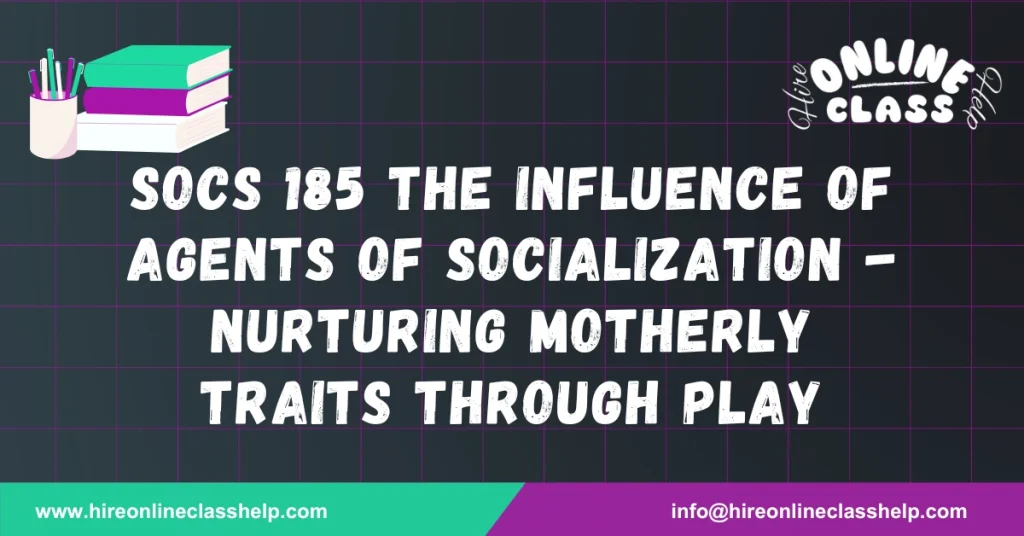






Name
Chamberlain University
SOCS-185 Culture & Society
Prof. Name
Date
The agents of socialization significantly influence our behaviors, values, and perceptions of societal roles. By reflecting on personal experiences, particularly childhood play with baby dolls and the game “House,” we can observe how these socializing agents shape nurturing and maternal traits. These early experiences have contributed to the author’s perception of motherhood, fostering selfless qualities that persist into adulthood.
As defined by Kendall (2018), agents of socialization refer to individuals, groups, or institutions responsible for teaching the norms, values, and behaviors necessary for social interaction. These agents include the family, peers, educational institutions, and media, all of which provide a framework for how we engage with the world and others. From early childhood, these agents play a pivotal role in shaping an individual’s identity and guiding their behavior in various social contexts.
During childhood, the author spent extensive time playing with baby dolls, which became an integral part of their early development. The dolls were more than toys—they represented the care and love received from the author’s parents. This early interaction led the author to unknowingly develop nurturing and selfless qualities often associated with motherhood. By caring for the dolls, the author cultivated traits such as empathy and responsibility, which have since carried over into adult life.
Another key agent of socialization was the game “House,” played with cousins. The author frequently assumed the role of the “mama” figure, which involved caring for imaginary children. Through this role-playing, the author explored family dynamics and the significance of the mother-child relationship. This game provided a valuable platform for internalizing familial values and understanding the responsibilities that come with being a caregiver. It laid the groundwork for the author’s perception of motherhood, emphasizing the importance of nurturing and caring for others.
According to Glasberg et al. (1992), toys are powerful educational tools that enable children to develop essential skills and explore roles they may eventually fulfill as adults. For the author, playing with baby dolls was an early form of education that taught valuable lessons in empathy, compassion, and responsibility. These experiences mirrored the caregiving aspects of their current profession, in which they now care for babies daily. The early interactions with dolls laid a strong foundation for understanding others’ needs and honing the ability to prioritize those needs, sometimes even before tending to one’s own.
The author’s early experiences with baby dolls and the game “House” left a profound and lasting imprint on their values and aspirations. The nurturing qualities and selflessness learned during childhood continue to shape the author’s perspective on caregiving and motherhood. The desire to become a mother, initially influenced by these agents of socialization, remains a central force in their life. This reflection underscores how early exposure to socializing agents can have long-term effects on an individual’s identity and future aspirations.
Agents of socialization are critical in shaping our behaviors, values, and overall identities. Childhood play, specifically with baby dolls and role-playing in games like “House,” can instill essential nurturing and maternal traits. These early socializing experiences significantly impacted the author’s life, shaping their values and influencing their desire for motherhood. The role of agents of socialization extends beyond childhood, leaving a lasting imprint on an individual’s perception of societal roles and responsibilities.
Kendall, D. (2018). Sociology in Our Times. Cengage Learning.
Silfen Glasberg, D., Maatita, F., Nangle, B., & Schauer, T. (1998). Games children play: An exercise illustrating agents of socialization. Teaching Sociology, 26, 130.